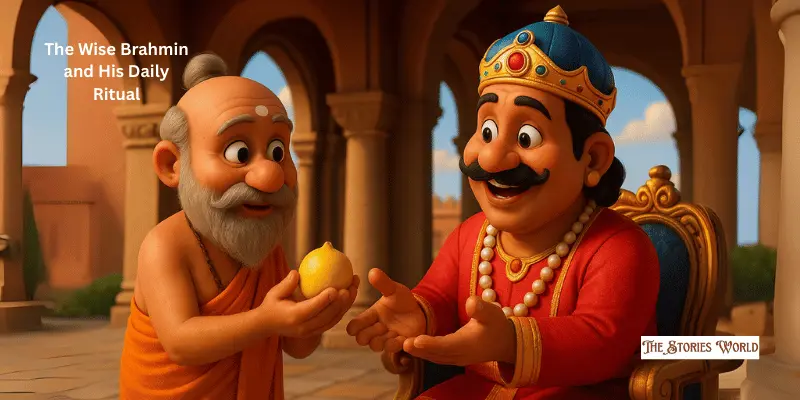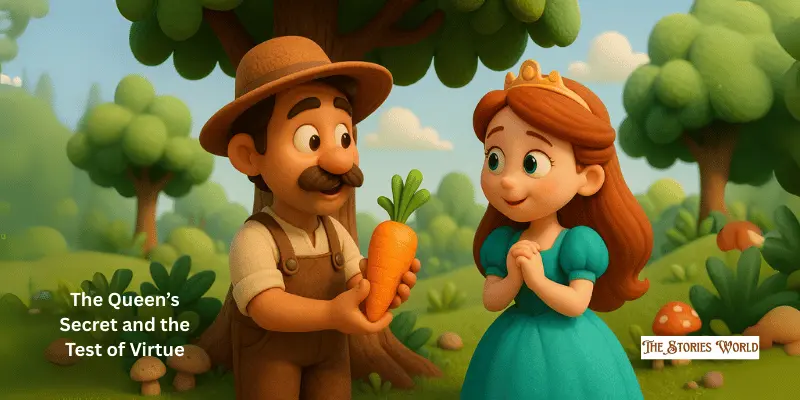The Good Will Grow Out of Good Moral Story – Indian Folktale
Updated: 21 Apr, 2025
228
“The Good Will Grow Out of Good” is one of those timeless moral stories in English that teaches a powerful life lesson in a simple way.
This story comes from Indian folktales with moral values, especially from a famous collection called Tales of the Sun folklore.
This Story is Perfect for?
This story is perfect for children aged 6 to 12. It’s a simple yet powerful tale that teaches important lessons about honesty, kindness, and patience.
Younger kids can enjoy the storytelling, while older children can learn from the story’s moral.
The story’s message of doing good and trusting truth is valuable for all ages, but it’s especially great for teaching kids important life lessons at a young age.
The Good Will Grow Out of Good Moral Story – Let’s Read
It’s a tale in which good actions, honesty, and truth play a big role—and where bad choices lead to trouble.
At the heart of this story is a beautiful message: good things will come back to you when you do good. It reminds us that kindness and truth always win in the end.
A long time ago, a kind and fair king named Patnîpriya lived in a peaceful and prosperous kingdom.
His people loved him for being wise, just, and respectful toward everyone, no matter their background.
The king believed that goodness should be rewarded and that truth always wins.
In this same kingdom lived an old and humble Brahmin named Pâpabhîru. He had little but was rich in wisdom and honesty.
Every morning, without fail, he would come to the king’s court holding a yellow lime as a gift. This wasn’t just a simple fruit but a symbol of respect and goodwill.
Along with the lime, he would say a short but powerful message in Tamil:
“If good is sown, then good will grow; if bad is sown, the bad will grow.”
In other words, whatever you do—good or bad—will return to you one day.
The king admired this wise saying and looked forward to hearing it daily.
It reminded him always to choose the path of truth and kindness.
This beautiful routine between the king and the Brahmin sets the stage for what becomes a folktale of honesty and truth.
As we move forward in the story, we’ll see how this simple message of good deeds and consequences plays a significant role in the lives of all the characters.
The Wise Brahmin and His Daily Ritual

Every morning, just as the sun rose, Pâpabhîru, the old Brahmin, would leave his small home with a yellow lime in hand.
He walked through the streets quietly, smiling at the people he passed. Though he didn’t have much, his heart was full of peace and kindness.
When he reached the palace, he would respectfully bow before the king and offer the lime with his usual words:
“If good is sown, good will grow; if bad is sown, bad will grow.”
This simple sentence meant everything to him. It was a lesson his father had taught him when he was young.
It reminded him to stay on the path of truth, no matter how hard life became.
The king admired Pâpabhîru’s loyalty and wisdom.
He knew that the Brahmin wasn’t just giving him a fruit every day—he was giving him a daily reminder to rule with fairness and kindness.
People around the court often talked about the Brahmin’s routine. Some found it strange, but others were deeply inspired.
They began to understand that his message wasn’t just for the king but everyone: do good, and good will come back to you.
This daily ritual might have seemed small, but it planted the seed for something bigger. Soon, that message would be tested—and its true power would be revealed.
The Queen’s Secret and the Test of Virtue

One day, something unusual happened in the palace. The king had left his room quickly and forgotten something important in the queen’s chamber.
Without thinking much, he asked the Brahmin, Pâpabhîru, to go and bring it for him.
Pâpabhîru was surprised by the request but obeyed the king and quietly walked into the queen’s room.
To his shock, he saw something he was never meant to see—the queen was not alone. She was with another man, secretly meeting him behind the king’s back.
Pâpabhîru was heartbroken. He greatly respected the king and never expected to witness such a betrayal.
But instead of reacting or speaking out, he quietly walked away and returned to the king with the item.
The king noticed Pâpabhîru’s silence and calm behavior.
He asked if everything was alright, but the Brahmin nodded and said nothing. He remembered his father’s advice:
“Never speak of what your eyes see if it’s not your place to speak.”
He chose to stay silent—not out of fear but out of respect, wisdom, and understanding. He believed that the truth would reveal itself at the right time.
This was a true test of his character and values, a moment in which honesty, patience, and trust in goodness were tested.
Little did he know that his silence would soon bring big trouble.
The False Accusation and Twist of Fate
The queen, afraid that Pâpabhîru might tell the king what he saw, quickly made a plan to protect herself. She went straight to the king and lied.
She said, “Your Majesty, the Brahmin entered my room and behaved in a disrespectful way. I was shocked and frightened.”
The king was stunned. He had always trusted Pâpabhîru. But hearing this from the queen made him angry and confused.
Without asking for the Brahmin’s side of the story, the king quickly decided that Pâpabhîru should be punished.
News spread fast in the kingdom. People were shocked.
Some believed the queen, while others couldn’t believe that a wise and honest man like Pâpabhîru could do such a thing.
But Pâpabhîru stayed calm. He didn’t cry, he didn’t fight back. Deep inside, he still believed in the words he had always spoken:
“If good is sown, good will grow.”
As he was being taken away for punishment, something unexpected happened.
The man who had been secretly meeting the queen—the one Pâpabhîru had seen—was caught trying to run away from the palace.
When the guards brought him in, everything became clear. The truth was out.
The king realized his terrible mistake. He had believed a lie and almost punished the wrong person.
This moment became a turning point. It showed how powerful truth can be—and how goodness, even when silent, always finds a way to shine through.
Truth Revealed, Justice Served
As the truth came to light, the king realized how wrong he had doubted Pâpabhîru.
He felt ashamed for believing the queen’s false accusations without first hearing the Brahmin’s side of the story.
The king called Pâpabhîru to his court and sincerely apologized for his mistake. “I was wrong,” the king said. You have always been honest and loyal to me, and I should have trusted you.”
The Brahmin, calm as ever, nodded and said, “Your Majesty, I only follow the path of truth. It is not my place to hold grudges or seek revenge. I trust that good will come from good.“
The king, moved by the Brahmin’s humility and wisdom, wanted to make things right. He asked, “What can I do to repay you for the injustice you suffered?”
Pâpabhîru replied, “I do not need wealth or titles. What I seek is justice. The queen must face the consequences of her actions.“
The king agreed and immediately ordered the queen’s banishment from the kingdom. She was sent away, and the kingdom was finally at peace.
Pâpabhîru was honored by the king with a new position—a trusted advisor, where his wisdom would help guide the kingdom.
The people of the kingdom cheered for the Brahmin. They were inspired by his ability to stay true to his values, even in the face of unfairness.
Pâpabhîru’s actions proved that truth, patience, and goodness always lead to the right outcome.
Moral of the Story
The story of “The Good Will Grow Out of Good” teaches us a very important lesson: Good deeds always lead to good results, even if the truth takes time to be revealed.
Goodness will eventually shine when you stay honest, kind, and patient, even in difficult situations.
It shows us that lying and deceit may give temporary success, but in the end, truth always wins.
It also reminds us to trust the good in others and never to judge too quickly. Sometimes, the right thing to do is to stay calm and wait for the truth to come out, just like the wise Brahmin.
In life, always remember: what you sow is what you reap. If you plant kindness, honesty, and good actions, good things will return to you!
What Kids Learn from This Story
From “The Good Will Grow Out of Good”, kids can learn many important lessons, such as:
- The Power of Goodness: Even when no one is watching, doing good things always leads to good outcomes. Good actions will always come back to us in the end.
- Honesty is Important: Lying or being dishonest may seem easy, but the truth will always emerge. It’s better to stay honest, no matter the situation.
- Patience and Trust: Sometimes, waiting for the truth to reveal itself is important. Staying calm and patient helps us make the right decisions.
- Forgiveness and Understanding: Even when others make mistakes, understanding and forgiving can bring peace and healing.
- The Importance of Making the Right Choices: Our actions have consequences, and this story teaches kids that the right path is always the best choice.
Follow-up Questions for “The Good Will Grow Out of Good”
| Follow Up Question |
|---|
|
Please Write Your Comments